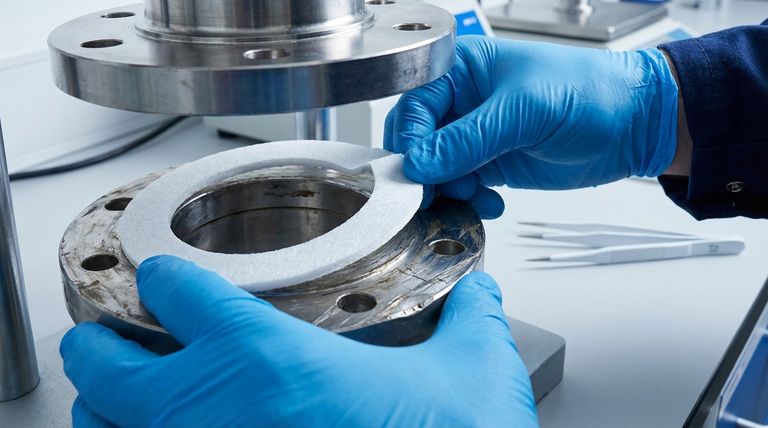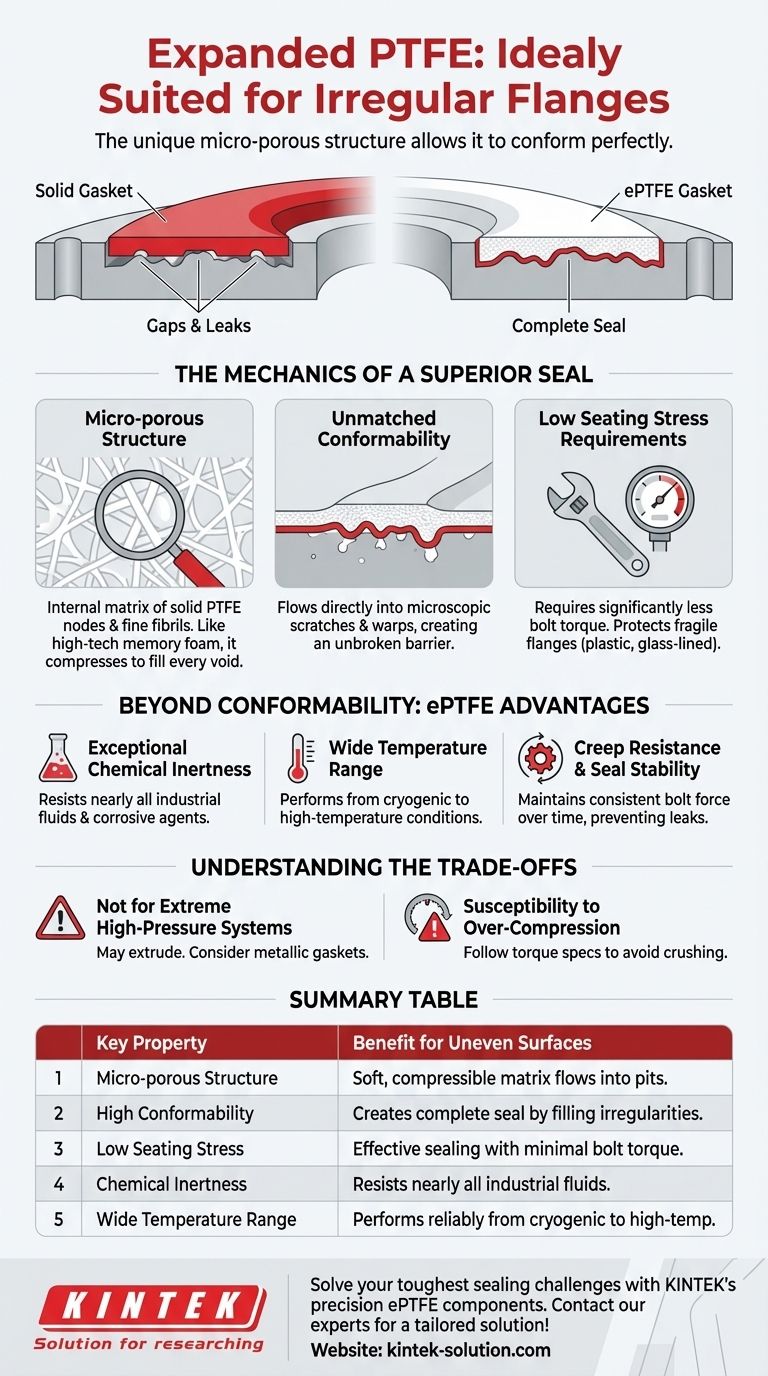At its core, the reason expanded PTFE (ePTFE) excels at sealing uneven surfaces is its unique micro-porous structure. This internal matrix of solid PTFE nodes interconnected by fine fibrils gives the material a soft, compressible quality, allowing it to conform perfectly to surface imperfections where more rigid gaskets would fail.
The critical takeaway is that unlike solid gaskets that require high force and perfect surfaces, ePTFE acts like a malleable solid. It flows into microscopic pits, scratches, and warps with minimal bolt pressure, creating an exceptionally reliable seal on less-than-ideal flanges.

The Mechanics of a Superior Seal
To understand why ePTFE is the definitive solution for irregular surfaces, we must look at its physical properties. It isn't just a better material; it behaves fundamentally differently under compression.
The Power of a Micro-porous Structure
The manufacturing process for ePTFE creates a material that is mostly empty space, held within a strong web of PTFE fibers. This structure is key to its performance.
Think of it like a high-tech memory foam. When compressed, the material easily deforms to fill every void, crack, and imperfection on a flange face.
Unmatched Conformability
Standard gaskets can struggle with surfaces that are warped from heat, scratched from use, or simply have a rough finish. They bridge over these imperfections, leaving tiny pathways for leaks.
Expanded PTFE, due to its softness, flows directly into these irregularities. This creates a complete, unbroken seal across the entire surface.
Low Seating Stress Requirements
Because ePTFE is so malleable, it requires significantly less bolt torque to create an effective seal. This is a critical advantage.
This low-force requirement not only ensures a tight seal but also protects fragile flanges, such as those made of plastic, glass, or other sensitive materials that could crack under the high torque needed for harder gaskets.
Beyond Surface Irregularity: The Full ePTFE Advantage
While its conformability is its standout feature for uneven surfaces, its other inherent properties make it a versatile and robust choice for demanding industrial environments.
Exceptional Chemical Inertness
Like all PTFE, ePTFE is chemically resistant to nearly all industrial fluids and corrosive agents. This makes it a safe and reliable choice for chemical processing, pharmaceutical, and food-grade applications.
Wide Temperature Range
Expanded PTFE maintains its integrity and sealing capability across an extremely broad temperature spectrum. It performs reliably in both cryogenic conditions and high-temperature processes where other materials would become brittle or degrade.
Creep Resistance and Seal Stability
Despite its initial softness, once compressed, ePTFE exhibits excellent creep resistance. This means it maintains a consistent, stable bolt tightening force over time, preventing leaks that can develop as a result of thermal cycling and gasket relaxation.
Understanding the Trade-offs
No material is a universal solution. Being an effective advisor means acknowledging limitations to ensure the right material is chosen for the right job.
Not for Extreme High-Pressure Systems
While excellent for most applications, in extremely high-pressure scenarios, a metallic or semi-metallic gasket may be required to prevent the softer ePTFE material from being extruded from the flange.
Susceptibility to Over-Compression
The very softness that makes ePTFE effective also makes it vulnerable to improper installation. Overtightening bolts can crush the material's structure or cause it to extrude, leading to seal failure. Following torque specifications is critical.
Making the Right Choice for Your Sealing Application
Your choice of gasket material must be driven by the specific challenges of your application. Expanded PTFE is a powerful problem-solver when used in the correct context.
- If your primary focus is sealing warped, scratched, or uneven flanges: Expanded PTFE is the ideal choice due to its superior conformability.
- If you are working with fragile equipment (e.g., glass-lined or plastic flanges): The low torque requirement of ePTFE minimizes the risk of damage while ensuring a tight seal.
- If your application involves aggressive chemicals or extreme temperatures on an imperfect surface: ePTFE provides a reliable seal while offering the robust chemical and thermal resistance of standard PTFE.
By understanding its unique structural advantages, you can confidently specify ePTFE to solve your most difficult sealing challenges.
Summary Table:
| Key Property | Benefit for Uneven Surfaces |
|---|---|
| Micro-porous Structure | Soft, compressible matrix flows into pits and scratches. |
| High Conformability | Creates a complete seal by filling surface irregularities. |
| Low Seating Stress | Effective sealing with minimal bolt torque, protecting fragile flanges. |
| Chemical Inertness | Resists nearly all industrial fluids and corrosive agents. |
| Wide Temperature Range | Performs reliably from cryogenic to high-temperature processes. |
Solve your toughest sealing challenges with KINTEK's precision ePTFE components.
Struggling with leaks from warped, scratched, or uneven flanges? Our expanded PTFE gaskets are engineered to provide the ultimate conformable seal, ensuring reliability in semiconductor, medical, laboratory, and industrial applications. We specialize in custom fabrication—from prototypes to high-volume orders—to meet your exact specifications.
Let us enhance your system's integrity and efficiency. Contact our experts today for a tailored solution!
Visual Guide

Related Products
- Custom PTFE Parts Manufacturer for Teflon Parts and PTFE Tweezers
- Custom PTFE Parts Manufacturer for Teflon Containers and Components
- Custom PTFE Teflon Balls for Advanced Industrial Applications
- Custom PTFE Measuring Cylinders for Advanced Scientific and Industrial Applications
- Custom PTFE Microwave Digestion Vessels for Demanding Applications
People Also Ask
- What chemical processing applications involve PTFE-machined parts? Essential Components for Corrosive & High-Purity Systems
- What are the unique properties of PTFE? Unlock Unmatched Performance in Demanding Applications
- What finishing techniques are effective for machined Teflon parts? Achieve Functional Performance and Dimensional Stability
- What factors should be considered when choosing between Nylon and PTFE? Select the Right Material for Your Application
- What are the unique properties of PTFE? The 3 Pillars Driving Demand for High-Performance Parts



















